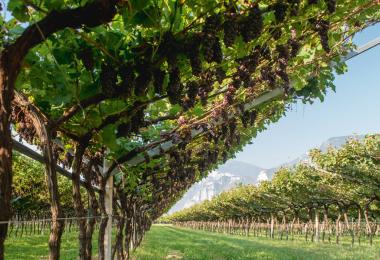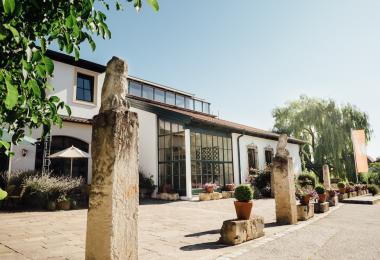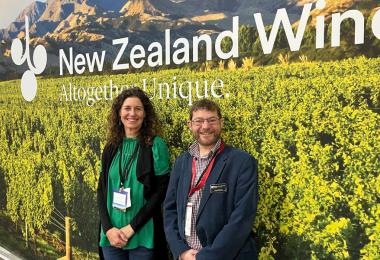Established systems
In Germany, the Fair'n Green label is the best known – and most widely used. "At the beginning, we look at the status quo of a winery," reports Dr. Keith Ulrich, chairman of the board of the Fair'n Green association, which awards the sustainability label of the same name. The winery must meet 50 percent of the required points to be included. 40 percent must be achieved in each of the three pillars of ecology, economy and social responsibility. The use of herbicides is allowed.
Fair'n Green started in 2013 with only seven members. Now there are more than 70. From the very beginning, top wineries were also included, such as Clemens Busch on the Mosel or Phillip Kuhn in the Palatinate. Today, Fair'n Green is active in several countries, including Germany, Italy, Switzerland, France and Israel. The seal is not only aimed at wineries. Wine shops can also be certified, as well as other businesses in the value chain: the first label-printing company recently obtained its certificate.
The German Institute for Sustainability (DINE), based in Heilbronn, was founded ten years ago as a non-profit association. Just like Fair'n Green, it is based on the same three pillars of ecology, economy and social responsibility. DINE also works with external testing bodies and, here too, herbicides can be used if studies show that they do not harm the environment. Besides the carbon footprint, one focus here is also biodiversity. With only ten members, the initiative is somewhat smaller.

The German winemaker Alfons Hormuth drives only electric cars to reduce CO2
Complement to organic labels
Although the "Fair'n Green" certificate is also available in Austria, Austria has been working towards its own label. "Sustainable Austria" was developed in 2015. Austria Wine Marketing (ÖWM) emphasises that it is important to see the system "consciously as a supplement and alternative certification method." They are aware that the distinction between organic and biodynamic viticulture and sustainability approaches is based on "different criteria,” which is why "a comparison in the sense of 'one system goes beyond another' is misleading."
The focus should also, but not only, be on CO2 consumption, as well as "other criteria such as energy consumption, material consumption, soil, biodiversity and water. In addition, the entire production chain - from the vineyard to the labelled and packaged bottles - as well as social and economic criteria, are taken into account." Interested producers can submit their previous sustainability performance to a self-test online. The results are then checked by an independent panel. Glyphosate has been banned since 2018.
The designation is experiencing a real boom. From 2018 to date, the number of certified farms has risen from 80 to 232. The area cultivated by them amounts to 5,790 hectares in 2019, which is 12.4 percent of Austria's cultivated area.
The Scandinavian markets in particular focus on fairly and environmentally produced wine. The Norwegian "Vinmonopolet," for example, set up its own import quota for wines with "Sustainable Austria" certification last year.

Those in Austria who want to apply for the certificate can start with a self-test online. A spider diagram with a traffic light system shows how well the company is doing. The black dots mark the current value. The further out the point lies, the more sustainable in this area.
Focus on vineyards
In France, the main focus is usually on the work in the vineyard. The label "Haute Valeur Environmentale" (HVE), which is already well known beyond the country's borders, was developed in 2001 by the Ministry of Agriculture - and not only for viticulture. The system provides for a three-stage certification, focusing on biodiversity and the management of plant protection, water, and fertilisers. The label is popular, probably also because it is less strict than organic certificates and partly allows the use of chemicals.
This is precisely what has caused a stir in recent weeks: The environmental activist Valérie Murat, among others, had written on the internet about pesticide residues in wines from Bordeaux, which were all labelled HVE. The Interprofession Gironde and 25 producers sued her for defamation, and won: According to the expert opinion, the pesticide residues were within the permissible range.
In the prestigious region of Champagne, vintners are working on their own goals. Efforts to promote sustainable viticulture have been underway in Champagne for a good two decades. In 2003, for example, the region was the first to calculate its carbon footprint and to introduce measures to reduce CO2 emissions. The aim is to reduce CO2 emissions by 75% by 2050. In addition, the focus is on biodiversity and the water balance. By 2025, there is to be a complete abandonment of herbicides.
Finally, by 2030, no less than 100% of the region should have an environmental certificate, according to the Comité Interprofessionnel du Vin de Champagne (CIVC). More than 20% are already certified organic, and 15% have the CIVC's own label "Viticulture curable en Champagne" (VDC), created in 2014. A total of 366 establishments are certified, including houses such as Lanson, Bollinger, Vranken Pommery or Taittinger.
Multi-level sustainability
Equalitas was founded in Italy in 2016 with the aim of bringing together the various programmes that existed until then. The wine association Unione Italiana Vini (UIV) and Federdoc, the umbrella organisation of the Italian DOC consortia, manage this effort.
Producers, wines and vineyards can be certified. The system provides for a step-by-step development and gradually the various requirements must be fulfilled within the three years of the certification process. The approach is broad: In addition to ecological sustainability, value is placed on social and economic factors, such as workers' rights and promotion or dealings with trading partners. Corporate communication is also assessed. The aim is to create the greatest possible transparency about the company's activities. Equalitas currently lists 36 wine companies on its homepage.
As in France, there are also efforts by individual regions for more sustainability in Italy. The South Tyrol Consortium launched its "Agenda 2030" in September 2020 together with the Advisory Council for Fruit Growing and Viticulture, the Laimburg Agricultural Experiment Centre, Eurac, the Free University of Bolzano and sustainability expert Alfred Strigl.
In addition to plant protection in the vineyard, where synthetic herbicides are to be completely dispensed with by 2023, measures are planned such as switching to organic fertilisation, biodegradable materials instead of disposable plastics, and optimising water consumption and the CO2 footprint. The 2030 Agenda is not a certificate, but a community commitment. Five pillars form the basis: soil, vines, wine, land, and people - with the last point focusing primarily on communication measures to raise awareness of sustainability among producers, retailers and customers.

Wooden wine boxes are recyclable and thus protect the environment
Expansion
Organic viticulture plays an important role in Spain - that is well known. From 2009 to 2019, the organically cultivated vineyard area in Spain grew from 53,958 to 121,279 hectares. The association Wineries for Climate Protection (WfCP), founded by the Spanish Federacion Española del Vino, is also committed to sustainability. The focus is on environmental protection. Renewable energies, greenhouse gas reduction, and waste and water management are the most important pillars. By the end of this year, social and economic criteria should also be part of the programme.
Every two years, the certified winery will be inspected and, upon passing, the certificate renewed. WfCP is supported by the Spanish Ministry of Agriculture. With 33 bodegas currently certified, participation is on the rise.
New concepts
And then there are also counter-movements - or rather: further movements. A somewhat more radical approach is being pursued under the heading of "regenerative viticulture." The organisation Regenerative Organic Certified (ROC) was founded in 2017 by several farmers and has as its motto: "Farm like the world depends on it." Not only winegrowers are addressed, but all farmers. The rules are strict; nature and people are to be helped to help themselves, so to speak, instead of "only" treating them better or fairer than before. In the vineyard, for example, the CO2 emissions caused by machines are to be completely offset by photosynthesis, for example through additional crops.
Social sustainability does not come about through fair salaries and labour laws alone. Instead, the programme stipulates that all employees should participate in the company's decision-making processes. The certification process takes at least four years, and the advantage is that existing organic labels are taken into consideration.
Corporate Responsibility
Despite different focuses, the social component is playing an increasingly important role in almost all countries. Thus, even outside of certificates and labels, efforts are being made by wineries and businesses to fulfil their corporate responsibility.
Large companies such as Torres publish an annual Corporate Social Responsibility Report. On many pages, it explains how the company is committed to its employees, society, customers and the environment. At the beginning of March, Torres also announced that it would convert another 500 hectares of vineyards in the DOs Penedès, Priorat and Conca de Barberà to organic farming. Such a commitment naturally also has a positive image effect.
Vivant, a new tasting platform based in France and the USA, organises digital tastings with wineries from all over the world. The aim is not only to market sustainable wineries better. One percent of the revenue from membership fees and purchases via the platform goes to the "1% for Wine" initiative, which aims to promote innovation and research.

Employee satisfaction on farms certified under the Regenerative Organic Certified (ROC) programme means that all employees have a say in decisions - whether they work in the cellar or the vineyard.
Diversity
Other companies are making a name for themselves with support programmes for the disadvantaged. In February, the Californian winery Delicato Family Wines launched a scholarship for people of colour who want to attend one of the three Californian wine universities. Besides financial support, training is offered, for example through paid summer internships, and a job is guaranteed after graduation.
"There are thousands upon thousands of wineries in this country. And of those wineries, there are only a few dozen that are black-owned," said Phil Long, president of the Association of African American Vintners organisation. Since 2019, he said, the association has grown 500 percent, but there is still a lot of work to be done, he said.
Napa winery Heitz Cellar is a co-founder of The Roots Fund, which also supports wine students of colour. The Great Wine Made Simple Foundation, a co-project of the Napa Valley Vintners and Master Sommelier Andrea Robinson, also promotes women in the wine industry.
At the beginning of March, the US company Constellation Brands announced that it would invest a total of US $10 million in the Clear Vision Impact Fund. The fund grants loans to minority-owned businesses. Constellation plans to invest a total of US $100 million in the promotion of such companies by 2030.
The list of such programmes is of course longer, but this brief overview shows that many companies recognise that responsibility for people and nature does not end with green electricity or a pay cheque.








